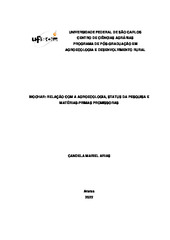Biochar: relação com agroecologia, estado da pesquisa e matérias-primas promissoras
Abstract
To reduce the environmental impacts caused by most food and raw material production systems, it is essential to change the paradigm of agricultural production to that of sustainability. In this context, agroecology presents itself as a science, practice and movement that provides tools for the development of agricultural systems that positively impact the social, environmental and economic spheres. Several tools can be developed to strengthen sustainable practices and, among them, the use of biochar.This dissertation aims to understand the relationship between the use of biochar in the context of agroecology, to analyze the situation of research and dissemination on biochar in Brazil, as well as the raw materials used for its production. For this, a bibliographic review was initially carried out, using the Web of Science database, in order to understand the impact of biochar in the social, environmental and economic spheres related to agroecology. Then, a bibliographic and bibliometric review was carried out, using the Software VosViewer, aiming to identify the countries, researchers and institutions that most collaborated in these investigations and the most promising raw materials for the production of this input. As environmental advantages, biochar contributes to increased productivity by reducing impacts on natural resources by improving the physical, chemical and biological attributes of the soil, in addition to contributing to the reduction of the volume of agricultural waste generated, reducing greenhouse gas emissions.. Regarding the social and economic benefits, the farmers have greater autonomy in relation to the fertilizer market, the reduction in production costs and the To reduce the environmental impacts caused by most food and raw material production systems, it is essential to change the paradigm of agricultural production to that of sustainability. In this context, agroecology presents itself as a science, practice and movement that provides tools for the development of agricultural systems that positively impact the social, environmental and economic spheres. Several tools can be developed to strengthen sustainable practices and, among them, the use of biochar.This dissertation aims to understand the relationship between the use of biochar in the context of agroecology, to analyze the situation of research and dissemination on biochar in Brazil, as well as the raw materials used for its production. For this, a bibliographic review was initially carried out, using the Web of Science database, in order to understand the impact of biochar in the social, environmental and economic spheres related to agroecology. Then, a bibliographic and bibliometric review was carried out, using the Software VosViewer, aiming to identify the countries, researchers and institutions that most collaborated in these investigations and the most promising raw materials for the production of this input. As environmental advantages, biochar contributes to increased productivity by reducing impacts on natural resources by improving the physical, chemical and biological attributes of the soil, in addition to contributing to the reduction of the volume of agricultural waste generated, reducing greenhouse gas emissions. Regarding the social and economic benefits, the farmers have greater autonomy in relation to the fertilizer market, the reduction in production costs and the generation of extra income with the commercialization of the final product. The bibliometric analysis allowed us to identify that publications on biochar in the Brazilian agricultural context began in 2003, with a tendency to rise from 2015 and peak in 2021. The Brazilian Agricultural Research Corporation (EMBRAPA) was the institution with the greatest contribution of scientific publications, with Novotny E. and Madari B. as the most prominent authors. Importantcollaborations in research on biochar in Brazil with researchers from other countries were identified, especially Spain and the United States. Materials of plant origin are the most used for the production of biochar in Brazil, especially those from wood. There was an evident and promising trend in the use of plant residues from the sugar-energy industry and materials of animal origin, with emphasis on poultry litter. Despite the high supply of raw materials, regional studies are needed that address the use of available raw materials, highlighting the potential that biochar can have to solve problems related to the management of urban waste or the reuse of waste of animal origin.
Collections
The following license files are associated with this item:

